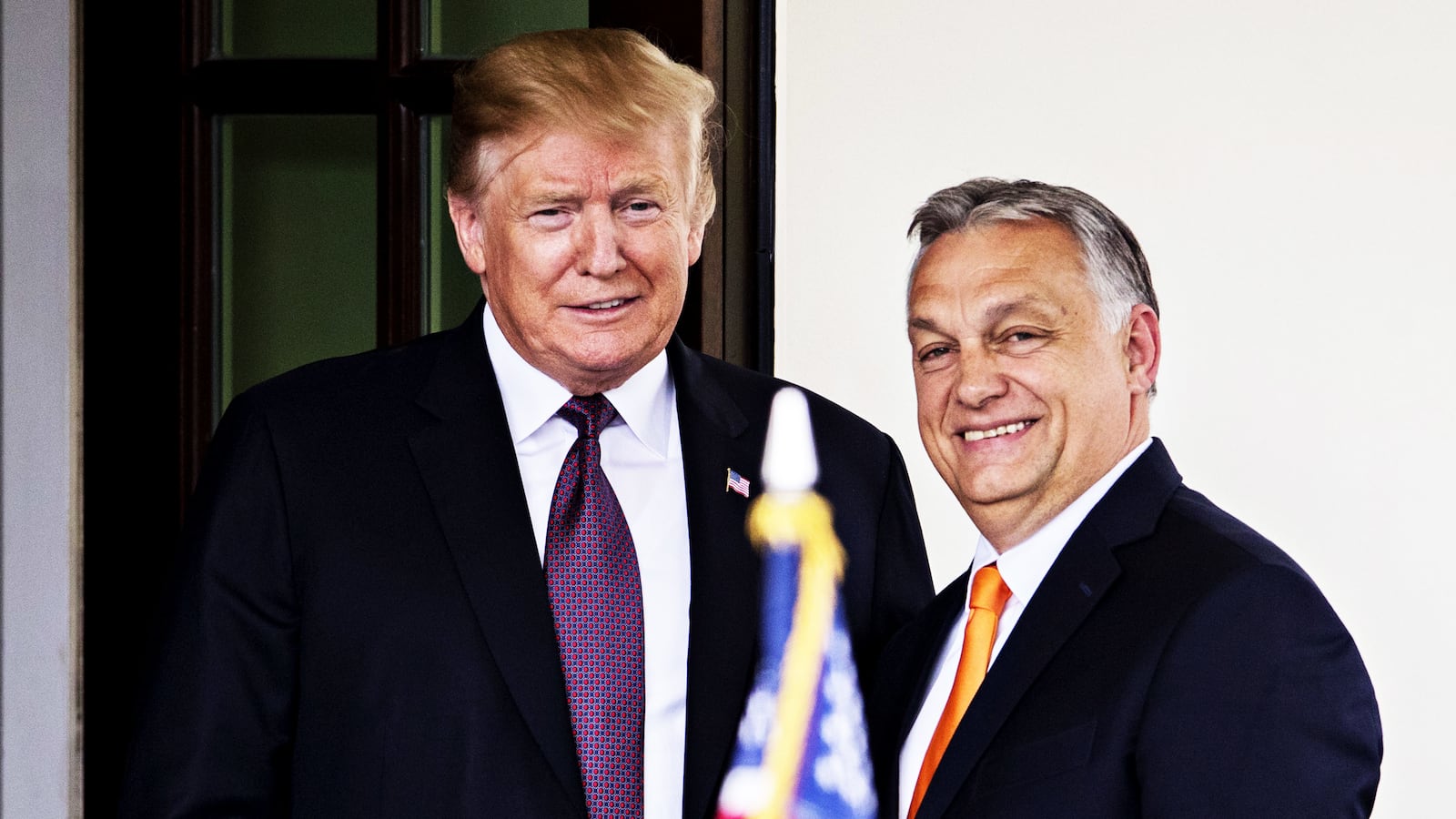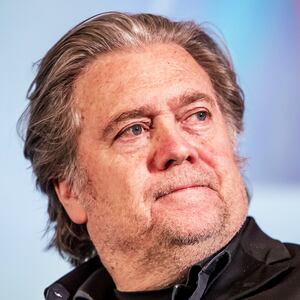Donald Trump, a president who never met a dictator without falling in love, must have felt both utterly intrigued and slightly shorted by his visit with Hungarian Prime Minister Viktor Orban today. Orban had been frozen out of both the Bush and Obama White Houses and State Departments but received the singular honor of an Oval Office meeting today.
On the one hand, Orban is a part of the small-ball, slow-creep authoritarian movement, not the splashy, missile-parade style of Kim Jong Un. He lacks the cutthroat Great Power Player musk that comes off Russian strongman Vladimir Putin in waves and makes Trump weak in the knees. He’s not a sweaty backwater warlord like Rodrigo Duterte in the Philippines.
No, Orban is a more subtle flavor, a kind of bijou strongman. A source of fascination for Steve Bannon, the architect of much of Trump’s nationalist populist claptrap, the prime minister is a proud advocate for what he calls “illiberal democracy.” Trump’s envious nature must have been in overdrive today.
The rise of pluralistic democracies in Eastern Europe was considered one of the great triumphs of human freedom in the wake of the Cold War. Hungary was an educated, optimistic nation that had escaped many of the worst depredations of Soviet rule. Orban started as a reformer—he once worked for George Soros!—and became a man edging closer and closer to authoritarian power.
Orban has famously reduced the power of the courts and the rule of law in Hungary, a move Trump must envy. Trump has simply defied most efforts to force him to comply with the law and made a few court appointments that Mitch McConnell and the Federalist Society would have approved regardless. Orban’s long march through Hungary’s legal institutions has transformed the nation.
“This all has the veneer of legality, so you assume Hungary is still a democracy based on the rule of law and respecting fundamental rights and European Union values,” Petra Bard, an expat Hungarian legal scholar now living in Germany, told NPR. “It’s hard to stomach that laws have been used to drive a democratic country into authoritarianism.”
While Trump’s state propaganda organs may be bigger, Orban’s are even more compliant, if that can be imagined. Hungarian state media gives Orban 24/7 coverage of the same lurid cast as the average Fox News evening lineup. In November of 2018, Orban’s government commanded the forced sale of “over 400 news websites, newspapers, television channels and radio stations to the Central European Press and Media Foundation, a group founded in August that had previously played little role in the Hungarian media.” The board members of the CEPMF are all Orban cronies, of course; it’s as if every major media property in the U.S. had been sold at gunpoint to Rupert Murdoch.
Orban rose from being a penniless student to being the single richest man in Hungary in just 20 years. Putin’s story is the same, and Trump quite evidently hopes to monetize his time in government like the big kids do. Cronyism isn’t a bug in authoritarian and authoritarian-lite systems, it’s a feature. The little stuff—foreign governments, renting out Trump hotels, Ivanka raking in foreign trademarks and patents, and all that sweet, sweet business lending emerging from Jared Kushner’s role on the world stage are of a piece with Orban’s rise to wealth. Just as in Washington, the Hungarian government is now pay-to-play. Welcome to the future.
Put it this way: The prime minister is walking the walk our president talks. Donald Trump says he’s the richest guy around. Viktor Orban really is, after decades of using his office to loot his country.
Of course, another idée fixe both men share is immigration, control of borders. More to the point, they share a belief that migration alters that character of a nation only for the worse.
This is explicitly racial for Orban, and very nearly so for Trump. Make America White Again is a not-so-subtle Trumpian trope. For Orban, who lives in a homogenous, not propositional, nation there’s no need to be at all subtle:
Diversity is not an asset, but a characteristic: an asset is something different, meaning something else. And since diversity is a characteristic, it cannot be sorted into a particular moral category ranked against other characteristics. Diversity is no more valuable than a homogeneous community. The simple fact that something is colourful and varied in character does not make it more valuable than something which is not. And it is very important for us to use this as a firm footing: we must not allow the ground to be cut away from under our feet in moral or ethical debates, because we must defend Hungary as it is now. We must state that we do not want to be diverse and do not want to be mixed: we do not want our own colour, traditions and national culture to be mixed with those of others. We do not want this. We do not want that at all. We do not want to be a diverse country.
It’s no wonder Hungary has become a haven for the alt-right. Peter Kréko, a Hungarian political analyst who specializes in the spread of populist and extremists movements, noted that alt-right expats there “are happy that they feel that in Hungary there is a leader that represents their values. These are people with an almost medieval view on the world and they find a safe haven in Hungary.”
The idea that the borders and bloodlines of each nation are under a constant, unremitting attack by the brown outsiders is an old song now bring hummed here, too, by a growing number of Republicans in Congress and in Trump’s White House.
They’re doing much more than humming in Hungary. Orban’s erection of a razor wire fence on his borders with Serbia must stoke a sense of jealous rage from Trump, who despite his bluster hasn’t built a single inch of his promised Wall on the border with Mexico.
Americans should look at Orban as a warning. He’s Trump, with 25 years in the driver’s seat. He’s producing precisely the results we’ll see from Trumpism if it continues as a dominant political philosophy: a corruption of institutions and values, a racial politics, suppression of a free press, and democracy in name only.
The White House is spinning this as a great-power play given rising Russian and Chinese influence in Hungary, but that defense rings hollow. Orban and Trump are birds of a feather in a flock that seems to be growing faster than the democratic institutions they so despise.







